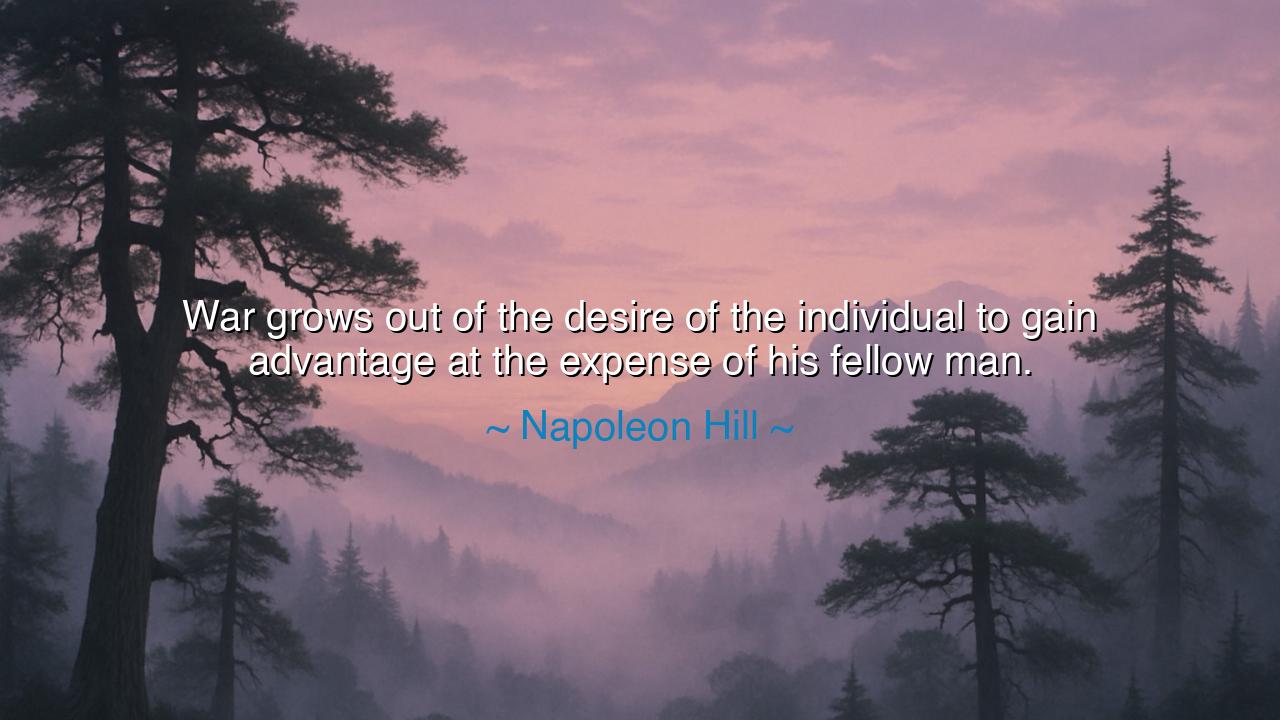
War grows out of the desire of the individual to gain advantage
War grows out of the desire of the individual to gain advantage at the expense of his fellow man.






Napoleon Hill, seeker of truths about human ambition and success, once declared: “War grows out of the desire of the individual to gain advantage at the expense of his fellow man.” These words strip war of its masks. They show it not as the clash of nations alone, but as the magnified shadow of the human heart. For every battle begins first in the breast of one who desires more — more land, more power, more glory — even if it costs his brother’s blood. Thus Hill teaches that war is not merely political, but deeply personal, born of unchecked greed and selfish ambition.
The desire to gain advantage is as old as mankind. Cain slew Abel, not because of nations, but because of envy. That same spirit, when multiplied, becomes war. Leaders cloak their hunger in fine words: defense, security, destiny, honor. Yet behind these banners lies the ancient truth Hill unveils — that one man or one people seeks to prosper at the cost of another. War is not born of necessity alone, but of selfishness unrestrained.
History offers unending testimony. Consider the First World War. Though sparked by the assassination of an archduke, it grew not from that event alone, but from the ambition of empires. Austria sought dominance over Serbia, Germany sought to expand, Britain and France sought to defend their advantage. Each nation, like an individual, grasped for more, fearing that others would gain what they might lose. The result was a storm that consumed millions, though no people truly prospered. Hill’s words stand clear: the desire for advantage brought forth destruction instead.
Or look to the conquest of Alexander the Great. He led armies across Asia, driven by vision and ambition. To many, he appeared heroic. Yet beneath the glory lay the same truth: one man’s desire for advantage meant countless others stripped of their lands, their freedom, their lives. Cities burned, cultures were absorbed, families shattered. Though Alexander gained a world, the cost was borne by his fellow men. Here again, war was not necessity, but ambition writ large.
But Hill’s insight cuts deeper still. He reminds us that the seeds of war lie not only in kings and emperors, but in every individual. Whenever one seeks to prosper by taking from his brother, whenever one seeks success by undermining another, he feeds the same spirit that fuels nations to war. The quarrels of families, the rivalries of merchants, the betrayals of trust — these are small wars, born of the same root: the hunger to gain advantage at another’s expense.
The lesson is clear: peace begins in the heart. If each individual restrains his desire to harm another for his own gain, then nations too will be restrained. If men seek prosperity not by taking, but by creating; not by destroying, but by building; not by envy, but by cooperation, then the soil from which war grows will be barren. Hill calls us to examine ourselves, for every act of greed and selfishness is a spark that, if multiplied, may set the world aflame.
Therefore, beloved, live by a higher rule. Let your desire be not to gain advantage at the cost of your brother, but to lift him with you. Seek wealth in ways that enrich, not impoverish. Seek strength in ways that protect, not oppress. Seek success that blesses all, not just yourself. For in this way, the wars of the heart will cease, and with them, many wars of the world. And if enough men and women live thus, then Hill’s warning will become not prophecy of doom, but testimony of wisdom overcome.






MHMinh Hieu
This quote makes me think about the human tendency to compete for more—whether it’s resources, power, or influence. If war is truly born out of this desire to gain at the expense of others, what does it say about our values as a society? How do we shift the focus from individual advantage to collective prosperity? Can we ever build a world where collaboration, not conquest, defines success?
HHuy
I find Hill’s quote fascinating because it puts war into a deeply personal context. It’s not just about nations clashing—it’s about individuals seeking personal advantage, sometimes on a global scale. How many conflicts could have been avoided if those in power were driven by cooperation instead of competition? Is there a way to reframe how we think about power and success, moving away from gaining at others' expense?
TTquang tran thang
This quote forces us to confront the uncomfortable truth that war is not just about large-scale politics, but about individuals who desire more at the expense of others. Does this mean that every conflict, at its core, is driven by personal interests rather than collective needs? How do we begin to address this deeply rooted issue in society—by cultivating empathy and prioritizing shared goals over individual victories?
QAquang anh
Hill’s statement makes me reflect on how power dynamics play out on a global scale. Is war merely a consequence of the egos of individuals and the collective pursuit of resources, power, and territory? If that’s the case, can we ever shift from this competitive mindset to a more collaborative approach in international relations? How much of human conflict could be resolved if we prioritized collective well-being over personal gain?
KLKyeu Ly-nh
Napoleon Hill’s quote highlights a fundamental issue in the human psyche—the desire to gain at the expense of others. War, in this sense, becomes a manifestation of personal greed and the willingness to sacrifice others for individual gain. Can we ever truly overcome this drive for power and control? What if society focused on cooperation and mutual benefit instead? Could that be the key to preventing future conflicts?